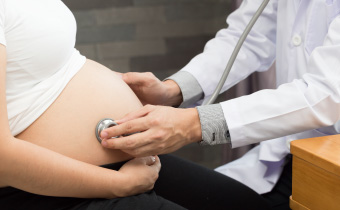Our team at OB-GYN Specialists for Women provides comprehensive care before, during and after your pregnancy. We are here to protect the health of both you and your baby, and answer all the questions you have about your changing body during pregnancy.
 Office Visits during Pregnancy
Office Visits during Pregnancy
You will come to the office throughout your entire pregnancy. Your visits will begin as monthly visits, and then bi-monthly, then towards the end of your pregnancy will be weekly. During these visits routine labs and tests will be performed depending on your gestational age.
Ultrasounds during Pregnancy
Ultrasound is a safe procedure that uses sound waves to produce an image of your baby. You will have an ultrasound around 6 to 12 weeks to confirm your pregnancy and determine your estimated due date. You will have a more comprehensive ultrasound performed between 18 to 20 weeks. This ultrasound will show the baby’s development and often — but not always — reveals the baby’s sex.
The team at OB-GYN Physicians is especially proud of our Ultrasound Department, which is staffed by registered sonographers and accredited by the American Institute for Ultrasound in Medicine Accreditation. This accreditation verifies that we meet the highest national standards and have a history of excellent patient care.
What is a High-Risk Pregnancy?
A high-risk pregnancy is one that threatens the health of the mother and/or her baby. Scheduling a preconception checkup is one of the best ways to avoid a high-risk pregnancy because it gives you the chance to treat or change the things that put you and the baby at risk.
- 35 years of age or older
- 15 years of age or younger
- Underweight or overweight prior to becoming pregnant
- Pregnant with more than one baby
- Gestational diabetes
- History of premature labor
- Had a premature baby
- Had a baby with a birth defect, especially heart or genetic problems
- High blood pressure, heart disease, diabetes, lupus, asthma, a seizure disorder, or another chronic medical problem

